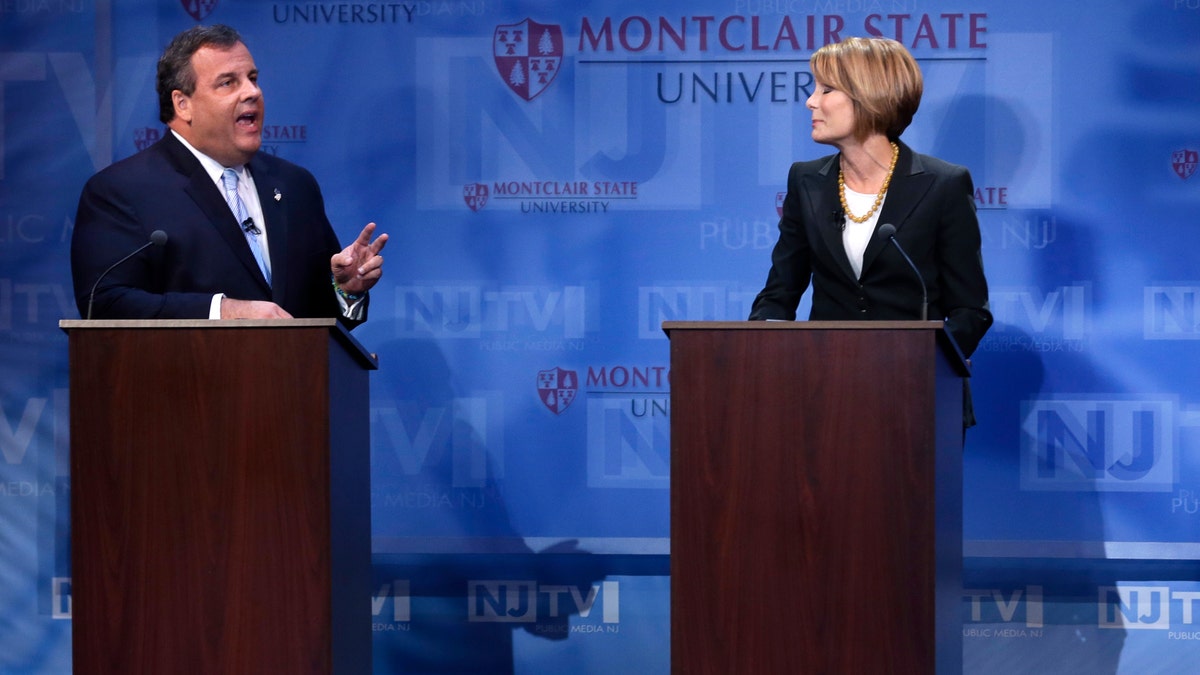
New Jersey Gov. Chris Christie and Democratic challenger Barbara Buono during their debate at Montclair University, Tuesday, Oct. 15, 2013. (AP)
In the final debate before the New Jersey gubernatorial election in November, Gov. Chris Christie said that his recent remarks in favor of letting undocumented students attend public colleges in the state at the same tuition rate as other residents did not amount to flip-flopping.
The issue arose in the debate just days after Christie said at a private Latino function over the weekend that he supports in-state tuition for undocumented immigrants – a change from previous public statements on the matter.
"What I always have said is that when economic times got better, that that would be one of the things that I would consider," Christie said during the debate at Montclair State University, where he faced his opponent, Democrat Barbara Buono, who long has been an emphatic supporter of in-state tuition for undocumented immigrants. "It’s time now — given that economic times are getting better and the state budget revenues are going up."
What I always have said is that when economic times got better, that that would be one of the things that I would consider. It’s time now — given that economic times are getting better and the state budget revenues are going up.
The issue of allowing undocumented immigrants to pay in-state tuition rates for higher education is particularly significant in New Jersey, which has one of the nation’s largest populations of people who are not in the country legally.
For years, supporters of in-state tuition have pressed New Jersey lawmakers to pass bills that have languished, under both Republican and Democrat administrations. At present, a measure, the In-State Tuition Bill/N.J. Tuition Equity Act, is pending in the state legislature.
They have aimed their lobbying at Christie since he became governor in 2010. Christie had expressed opposition to the state law, as well as the national version, known as the DREAM Act. Public comments that the governor made in past years seemed to base his opposition to the concept of giving undocumented immigrants access to in-state tuition rates to their immigration status.
In 2011, Christie took issue with a comment by Texas Gov. Rick Perry, a fellow Republican who, during the GOP primaries for the presidential election, said those who opposed giving undocumented immigrants some help to afford college were “heartless.”
Shortly after, Christie said at a meeting at the Ronald Reagan Presidential Library: “I want every child who comes to New Jersey to be educated, but I don’t believe that for those people who came here illegally, we should be subsidizing with taxpayer money, through in-state tuition their education.”
He added: “And let me be very clear from my perspective: That is not a heartless position, that is a common sense position.”
Then, in an appearance in New Jersey, Christie addressed the issue and raised the state’s fiscal problems, but he also noted that he opposed to giving breaks to people who break immigration laws.
"I can't favor that, because we need to have an immigration system where people follow the rules,” Christie said at the time, “and I can't in a difficult time of budget constraints support the idea that we should be giving money in that regard to people who haven't followed the rules, and take that money from people who have.”
On Tuesday, Christie said that now that the state is in better financial position, the state legislature must "talk about how we could responsibly fund tuition equality" during the lame duck session.
Buono, his opponent, balked in response.
"Be careful, this governor has a history of saying one thing and doing another," Buono said.
"It makes no sense from a moral perspective or from an economic perspective because all of our children need to have the skills and the education they need to compete in the 21st century to grow our economy," Buono said.
Proponents of strict immigration enforcement have criticized Christie’s comments.
“It comes at the expense of taxpayers and [legal] students who are struggling to pay for higher education,” said Ira Mehlman, a spokesman for the Federation for American Immigration Reform, or FAIR, to Fox News Latino. “[In-state tuition] is not popular with the electorate generally. It’s aliens taking seats and siphoning away tuition resource from other students.”
Though the governor's comments, when closely scrutinized, fall short of a full-throated endorsement, in-state tuition advocates say they'll take them.
"Regardless of the tone of his endorsement for the NJ DREAM Act, what is certain is that the governor is realizing that being anti-DREAM is not good state or national politics for any Republican, specially one running in a blue state," said Cesar Vargas, director of the DREAM Action Coalition. "Also, the DREAMers in New Jersey and across the country will continue to hold him accountable as we near election day and on his national aspirations."
Udi Ofer, executive director of the American Civil Liberties Union of New Jersey, voiced hope that Christie's public stance will give a boost to stalled legislative efforts in the state.
"We are very encouraged by Governor Christie’s words in support of tuition equality," Ofer was quoted as saying in the Newark Star Ledger. "His announcement should give a boost to lawmakers from both parties to pass the Tuition Equality Act and send it to the governor for his signature as soon as possible."




